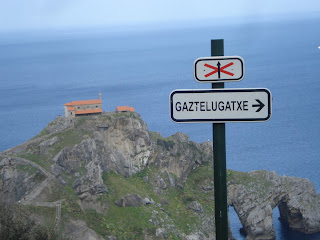Learn how to pronounce the name (gahz-eh-loo-GA-chay). Find friends that have a similar interest in hiking to a small island hermitage that may date back to the 10th century. Find out what a hermitage is. Discover the hike is only 3km, which is doable, because let's be honest, you're not much of a hiker.

Take the bus from Plaza Moyua to Bakio. Pay a nominal amount for said bus ride. Get off at the last stop. Immediately go to the right and begin walking. Take the smaller road when you get to the fork. Observe traditional Basque houses. Make friends with the horses you see along the way.

Climb a bunch of hills. Breathe heavily. Come to a small restaurant/ bar at the top of the hill. Say to yourself, "When in Spain," and indulge in a caña (or 3), even though it's 11 in the morning. Eat delicious pintxos.
Continue the hike. See Spanish women in their heels and nice clothes, and think, "If they can do it, so can I,". Ditto for the small children dressed in their Sunday best. Realize that going down steep hills covered in rocks means that at some point you will have to go up on the return trip.
Take 5 million photos. Realize that every step you take towards the church, there is a better photographic opportunity.
Reach the (300) stairs. Begin climbing. Observe the rugged Basque coast, and marvel at how difficult it was for anyone to invade. Think that that was perhaps why this region wasn't invaded too often.
Reach the top. Find that the church is locked. Look in the windows, and see a lot of trash. Ring the bell. Find the bathroom. Chuckle. Eat lunch, and get annoyed at all the other people ringing the bell.

Get back on the bus. Feel an overwhelming sense of accomplishment. Promptly fall asleep.

Take the bus from Plaza Moyua to Bakio. Pay a nominal amount for said bus ride. Get off at the last stop. Immediately go to the right and begin walking. Take the smaller road when you get to the fork. Observe traditional Basque houses. Make friends with the horses you see along the way.

Climb a bunch of hills. Breathe heavily. Come to a small restaurant/ bar at the top of the hill. Say to yourself, "When in Spain," and indulge in a caña (or 3), even though it's 11 in the morning. Eat delicious pintxos.
Continue the hike. See Spanish women in their heels and nice clothes, and think, "If they can do it, so can I,". Ditto for the small children dressed in their Sunday best. Realize that going down steep hills covered in rocks means that at some point you will have to go up on the return trip.
Take 5 million photos. Realize that every step you take towards the church, there is a better photographic opportunity.
Reach the (300) stairs. Begin climbing. Observe the rugged Basque coast, and marvel at how difficult it was for anyone to invade. Think that that was perhaps why this region wasn't invaded too often.
Reach the top. Find that the church is locked. Look in the windows, and see a lot of trash. Ring the bell. Find the bathroom. Chuckle. Eat lunch, and get annoyed at all the other people ringing the bell.

Begin your descent. Then begin your ascent. Again, breathe heavily. Hope for a few sprinkles. On your way down the mountain, pray that you don't eat it on the steep roads. Return to Bakio and check out the almost-empty beach. Compare sunburns.
Get back on the bus. Feel an overwhelming sense of accomplishment. Promptly fall asleep.
Originally posted 3.27.11

















